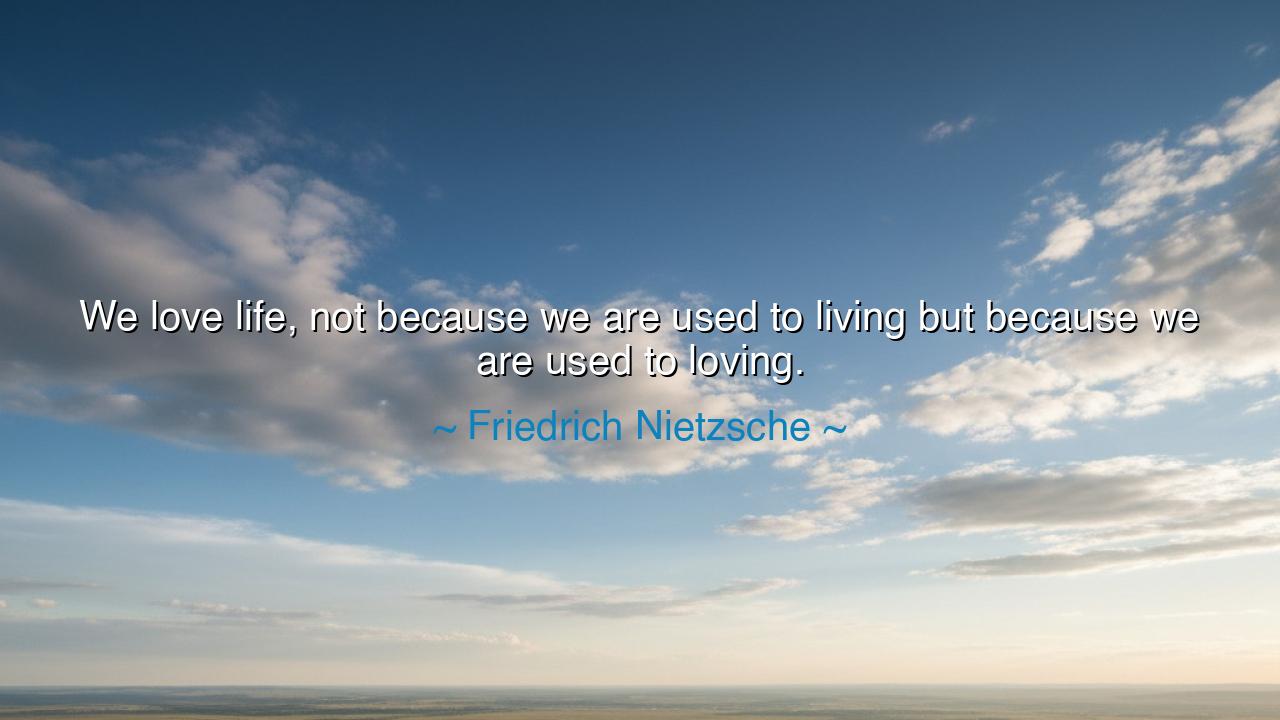
We love life, not because we are used to living but because we






When Friedrich Nietzsche declared, “We love life, not because we are used to living but because we are used to loving,” he uncovered a truth as timeless as the dawn itself: that it is love, not mere survival, that gives life its meaning. To simply exist—to breathe, to walk, to work—is not enough. A creature may live by habit, but a human being lives by affection, by passion, by the flame that burns between souls and gives warmth to existence. Without love, even the longest life becomes a cold procession of days; but with love, even a single moment can outshine eternity.
Nietzsche, though often called a philosopher of struggle and solitude, was also a philosopher of life’s vitality—its music, its beauty, its power to transcend despair. In this quote, he reminds us that the reason we cling to life is not out of fear of death or mere instinct, but because love binds us to existence. We do not love the repetition of waking and sleeping, of eating and laboring; we love the laughter that fills those days, the faces we cherish, the ideals that stir our hearts. It is love that turns existence from endurance into celebration. To love is to affirm life in all its imperfection—to say “yes” to being, even when it wounds us.
In the silence of human struggle, love becomes the pulse of meaning. Consider the story of Viktor Frankl, the psychiatrist who survived the Nazi concentration camps. In the midst of horror, stripped of freedom and surrounded by death, he found within himself an invincible truth: that even in suffering, man can find purpose through love. He wrote, “The salvation of man is through love and in love.” What kept him alive was not the habit of living—it was the image of his wife’s face, the memory of her smile. In the darkest night, that love gave him light. Nietzsche’s words echo this revelation: it is not the mechanics of life that sustain us, but the act of loving, which gives life something worth enduring for.
Love, in Nietzsche’s sense, is not limited to romance. It is the creative force, the will to affirm beauty even amid chaos. It is the artist’s love for his craft, the parent’s love for a child, the thinker’s love for truth, the friend’s love for loyalty. Wherever the heart commits itself fully—to another being, to a purpose, to a dream—life begins to glow. Even pain becomes noble when carried for love’s sake. The warrior who fights not for conquest but for home and honor, the healer who labors for the sick, the poet who gives voice to the silent—all of them live not out of habit, but because their love commands them to.
There is a hidden defiance in this quote. Nietzsche reminds us that habit is death disguised as comfort. Those who live only by routine, without love or wonder, are half-asleep. They breathe, but do not feel; they exist, but do not live. To be “used to living” is to be numb. But to be “used to loving” is to be ever-awake—to meet each dawn with gratitude, each sorrow with meaning, each person with reverence. Love keeps the soul alive, just as breath keeps the body alive. It teaches us to endure, not out of dull acceptance, but out of fierce devotion.
Yet love, as Nietzsche knew, is also dangerous. It opens the heart to loss, to rejection, to grief. But what is life without that risk? To love is to stand naked before existence and still say, “I embrace you.” It is to choose joy even when joy can be taken away. In this courage lies the secret of vitality. The one who dares to love—fully, freely, unconditionally—becomes greater than suffering. He or she touches the eternal rhythm of creation, where every heartbeat is an act of defiance against despair.
So remember this teaching: do not live merely out of habit—live out of love. Seek what awakens your heart. Cherish those who stir your compassion. Create what fills you with reverence. Love deeply, even when the world grows cold, for it is love that keeps the spirit from turning to stone. And when you grow weary, do not ask, “How shall I live?” but rather, “What shall I love?” For when you love truly, life itself becomes a hymn—sorrow and joy alike woven into the same divine melody.
Thus, Nietzsche’s words stand as both a revelation and a command: to love is to live. Without love, life is machinery; with it, life becomes miracle. And the one who has learned to love—not weakly, but bravely—has already mastered the art of living well.






AAdministratorAdministrator
Welcome, honored guests. Please leave a comment, we will respond soon